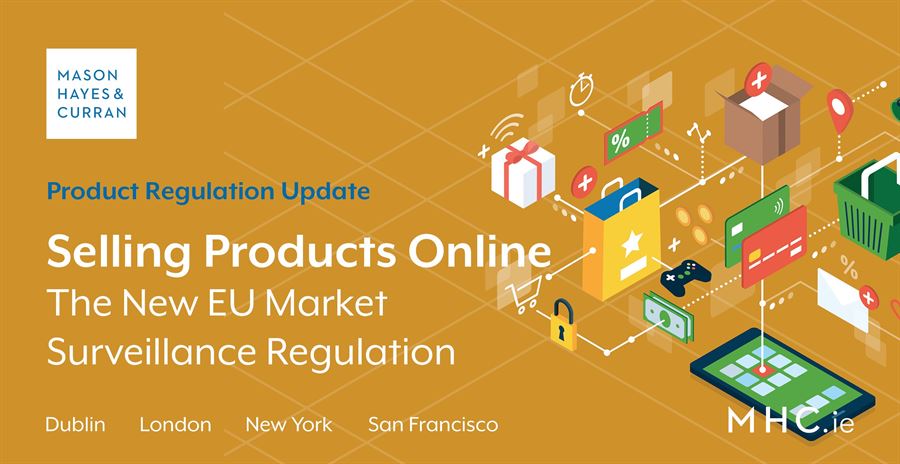Selling Products Online – The New EU Market Surveillance Regulation

The EU’s new Market Surveillance Regulation[1] (MSR) will come into full force on 16 July 2021. The MSR applies to products that are subject to a wide list of EU product legislation specified in Annex I, save where that legislation contains more specific, equivalent provisions regulating market surveillance and enforcement. One of the most notable aspects of the MSR is its focus on strengthening enforcement measures and ensuring consumer safety for sales of products conducted via online platforms.
Annex I includes (but is not limited to) medical devices, in vitro diagnostic medical devices (IVDs), construction products, toys, machinery, cosmetics and electronic and electrical equipment. As noted in its recitals, the MSR is intended to “complement and strengthen” the existing EU product legislation with an express intention to extend to online selling.
Gaps in the current system
Many stakeholders have been vocal about gaps in the current market surveillance system. These concerns include in particular the rapidly increasing complexity of supply chains, which can lead to difficulties identifying those responsible for EU compliance, as well as difficulties arising from online sales direct to EU consumers from outside of the EU, which can evade product conformity and import inspections.
To close this gap, the MSR attributes a compliance role to all ‘economic operators’ in the supply chain, including obligations to cooperate with market surveillance authorities (MSAs). It also obliges Member States to enhance the powers of their respective MSAs to ensure an effective level of market surveillance for products sold offline and online.
Obligations on economic operators
General obligations
The MSR defines an “economic operator” broadly to mean “the manufacturer, the authorised representative, the importer, the distributor, the fulfilment service provider or any other natural or legal person who is subject to obligations in relation to the manufacture of products, making them available on the market or putting them into service in accordance with the relevant Union harmonisation legislation”. This definition should, therefore, be wide enough to capture all entities in the supply chain for products subject to the MSR.
All economic operators are expressly obliged under the MSR to cooperate with MSAs regarding actions that could eliminate or mitigate risks presented by products they made available on the market. In the latter regard, it is important to note that the MSR clarifies that products sold online or via distance sales are deemed to be made available on the EU market if the offer is targeted at end users in the EU. This will be the case if the relevant economic operator directs, by any means, its activities to a Member State.
In seeking to cooperate with MSAs, economic operators also need to bear in mind that the MSR requires enhanced enforcement powers for MSAs. For more information on these increased powers, see our article from July 2020.
Requirement for EU established economic operators
In addition to the above general obligations on all economic operators, Article 4 of the MSR prohibits 18 specific categories products from being placed on the market unless an economic operator established in the EU is identified. These categories include (but are not limited to) construction products, PPE, toys, measuring instruments, pressure equipment and certain electrical equipment.
Notably, an “economic operator” for the purposes of Article 4 is slightly narrower than the general definition detailed above, and only includes:
-
The manufacturer
-
The importer, in instances where the manufacturer is not established in the EU
-
An authorised representative who has a written mandate from the manufacturer, or
-
A fulfilment service provider, where none of the above are established in the EU. This is a person or company offering at least two of the following services commercially: warehousing, packaging, addressing and dispatching, without having ownership of the products involved. However, postal and parcel delivery companies are specifically excluded.
The relevant economic operator must ensure the availability of their technical and conformity documentation. They are also responsible for cooperating with MSAs in cases of non-compliance and informing authorities when they believe a product presents a risk. Importantly, their name and contact details must be indicated on the product or its packaging, parcel or accompanying document.
Conclusion
Parties, in particular those involved in selling products online, should take note of the obligations under the MSR that will apply to them from 16 July 2021, and of the enhanced market surveillance powers being introduced.
For more information on the impact of incoming regulatory regimes on your business and its operations, contact a member of our Product Regulation & Consumer Law teams.
[1] Regulation (EU) 2019/1020 of the European parliament and of the Council on market surveillance and compliance of products and amending Directive 2004/42/EC and Regulations (EC) No 765/2008 and (EU) 305/2011
Share this:


